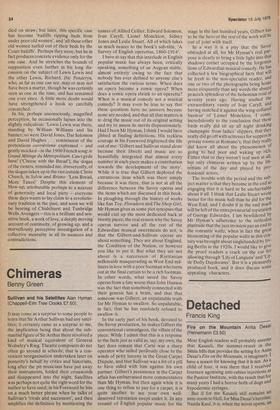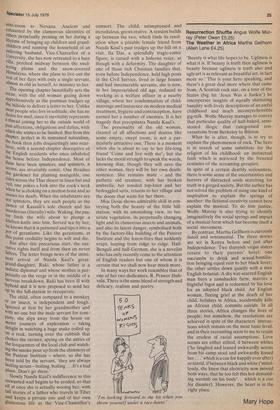Detached
Francis King
Fire on the Mountain Anita Desai (Heinemann £3.50) Most English readers will probably assume that Kasauli, the summer-resort in the Simla hills that provides the setting for Anita Desai's Fire on the Mountain, is imaginarY I have a reason for knowing that it is not. As a child of four, it was there that I received fourteen agonising anti-rabies injections at the Pasteur Institute, with the result that for many years I had a horror both of dogs and hypodermic syringes. But if for me Kasauli still remains an ante-room to Hell, for Miss Desai's heroine, Nanda Kaul, it is, when the novel opens, an ante-room to Nirvana. Ancient and exhausted by the clamorous identities of Others perpetually pressing on her during a lifetime of bringing up children and grandchildren and running the household of an unloving husband, Vice-Chancellor of a University, she has now retreated to a bare villa, perched midway between the swel!Ting plains and the snow-covered rliinalayas, where she plans to live out the rest of her days with only a single servant, almost as old as herself, to minister to her. The opening chapter beautifully sets the scene, with the old woman gazing down aPPrehensively as the postman trudges up the hillside to deliver a letter to her. Unlike Most people who live in solitude, she has no desire for mail, since it inevitably represents a thread joining her to the outside world of Past affections, obligations and duties, with which she wishes to be finished. But from this chaPter, perfect in its restrained naturalism, the book then jolts disquietingly into nearfarce, with a second chapter descriptive of the English residents who once inhabited the house before Independence. Most of these have been spinsters; and spinsters, it seems, are invariably comic. One thrashes the gardener for planting marigolds, • one rides across the Thar desert in linen hat and veil, one pokes a fork into the cook's neck When he is choking on a mutton bone and so causes his death. When the inhabitants are net spinsters, they are such people as the Pastor of Kasauli's sole church and his Murderous (literally) wife. Waking, the pastor finds the wife about to plunge a kitchen-knife into him. Served tea by her, he knows that it is poisoned and tips it into a Pot of geraniums. Like the geraniums, at tIlis point credulity begins to wilt and die. But after this precarious start, the narrative rights itself and from then on never falters. The letter brings news of the imminent arrival of Nanda Kaul's greatgrand-daughter, Raki, whose father is a sadistic diplomat and whose mother is perPetually on the verge or in the middle of a nervous breakdown. Raki has been ill with typhoid and it is now proposed to send her 111) to the hill-station to recuperate.
The child, often compared to a monkey or an insect, is independent and tough. Ignored at first by her grandmother and With no one but the male servant for comPany, she slips away from the house on secret journeys of exploration — taking delight in watching a huge snake coiled up on a rock, turning over the rubbish that chokes the ravines, spying on the antics of the frequenters of the local club and watching the smoke pour up from the chimneys of the Pasteur Institute — where, so she has been told by the servant, 'they are always boiling serum — boiling, boiling. . .It's a bad Place. Don't go there.' Slowly Nanda Kaul's indifference to this unwanted waif begins to be eroded, so that all at once she is actually wooing her, with tall stories of a father who travels in Tibet and keeps a private zoo and of her own glamorous life as the Vice-Chancellor's consort. The child, unimpressed and incredulous, grows restive. A tension builds up between the two, which finds its resolution when a pitiable female friend from Nanda Kaul's past trudges up the hill on a visit. Ila Das, a splendidly tragic-comic figure, is cursed with a hideous voice, as though with a deformity. The daughter of one of those rich Christian families that, even before Independence, held high posts in the Civil Service, lived in large houses and had innumerable servants, she is now, in her impoverished old age, reduced to working as a welfare officer in a nearby village, where her condemnation of childmarriage and insistence on modern medical treatment, hygiene and contraception, have earned her a number of enemies. It is her tragedy that precipitates Nanda Kaul's.
The personality of the old woman, cleared of all affections and desires like some empty, swept room, is not a particularly attractive one. There is a moment when she is about to say to her life-long friend 'Come and live with me'; but she lacks the moral strength to speak the words, knowing that, though they will save the other woman, they will be her own deathsentence. She remains mute — and the pathetic old creature, with her broken umbrella, her tousled top-knot and her bedraggled saris, returns to her village and the doom that waits for her there.
Miss Desai shows admirable skill in conveying both the beauty of the little hillstation, with its astonishing view, its luxuriate vegetation, its perpetually changing light and its clamorous insects and animals, and also its latent danger, symbolised both by the factory-like building of the Pasteur Institute and the forest-fires that suddenly erupt, leaping from ridge to ridge. HalfBengali and half-German, she is a novelist who has only recently come to the attention of English readers but one of whom it is certain that we shall now hear much more.
In many ways her work resembles that of one of her two dedicatees, R. Prawer Jhabvala. There is the same blend of strength and delicacy, realism and poetry. 'Beauty is what life hopes to be. Ugliness is what it is. If beauty is truth then ugliness is beauty because ugliness is truth also and ugly art is as relevant as beautiful art, in fact more so.' This is your hero speaking, and there's a great deal more where that came from. A Scottish rock star, on a tour of the States (big hit 'Jesus Was a Junkie') he intersperses insights of equally shattering banality with lively descriptions of an awful childhood and much incomprehensible gig-talk. Wolfe Murray manages to convey that particular quality of half-baked, semistoned illogic that categorised conversations from Berkeley to Bilston.
What he is after, though, is to try to explain the phenomenon of rock. The hero is in search of some substitute for the religion of his childhood: an instinctual faith which is mirrored by the frenzied ecstasies of the screaming groupies.
In spite of a certain deathly seriousness, there is some sense of the uncertainties and horrors of distracted souls searching for truth in a gorged society. But the author has not solved the problem of using one kind of inspiration to explain the springs of another: the fictional creativity cannot here explain the musical. To do him justice, Wolfe Murray is also trying to identify imaginatively the social springs and impact of a musical form which has become itself a social movement.
By contrast, Martha Gellhorn is curiously dated and sentimental. The three stories are set in Kenya before and just after Independence. Two thirtyish virgin sisters return to their parents' hotel: one succumbs to drink and sexual humiliation bringing equal ruin to her black lover; the other settles down quietly with a nice English botanist. A shy war-scarred English man buys a ramshackle farm, marries a frightful bigot and is redeemed by his love for an adopted black child. An English woman, fleeing grief at the death of her child, holidays in Africa, accidentally kills an African child, commits suicide. In all three stories, Africa changes the lives of people; but somehow, the resolutions are achieved in spite of the characters' interactions which remain on the most basic level, and in their recounting seem to me to retain the crudest of racial assumptions. Love scenes are either stilted, if between whites ('he laughed and leaned awkwardly across from his camp stool and awkwardly kissed her. . .' which is a cue for happily ever after) or torrid, if between black and white ('mindlessly, she knew that electricity now moved both ways, that he too felt this hot demanding warmth on his body'. . which is a cue for disaster). However, the heart is in the right place.



































 Previous page
Previous page